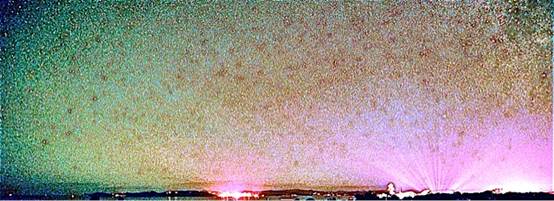
The Meaning of Sacrifice / Yajña
Bhagavad Gita XVIII.65 / Part II
Bhagavad Gita XVIII.65
Be devoted to Me [the One], fix your mind on Me,
To Me sacrificing, in reverence to Me,
Thou shalt come in Truth to me, to thee
I promise, as you are dear to Me.
manmana bhava madbhakto
madyaji mam namaskuru
mam evaishyasi satyam te
pratijane priyo ‘si me
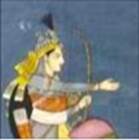
Yajña and the ‘gods’
“Perceiving one’s own life as a yajña marks also the culmination of
attaining wisdom.” – Swami Muni Narayana Prasad
Chapter III in the Bhagavad Gita reveals the interconnection between yajña
sacrifice and the gods. What are the ‘gods’? The Sanskrit word is ‘deva’
from the verb-root ‘div’ meaning ‘to shine’ — leading back into the concept
of the One as luminous effulgence. The gods are portions of the creative
forces of the One. Over the centuries, the gods have been personified to
make these metaphysical principles accessible.
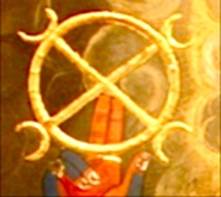
Bhagavad Gita III.11
May you cause the gods to be,
May they, the gods cause you to be,
Each other feeding, causing to be,
You shall reach the highest bliss.
Devan bhavayatanena
Te deva bhavayantu vah
Parasparam bhavayantah
Sreyah param avapsyatha
The Sanskrit word
bhava
means state of being, existence, emotion, feeling, attitude; from the
verb-root √bhu meaning to become, exist [J.Grimes dictionary].
J.A.B. van Buitenen translates the verse thus: “Give ye the gods being with
it, and the gods shall give ye being. And thus giving each other being, ye
shall attain the highest good.”
In his wonderful translation as dictionary, Winthrop Sargeant says in a
footnote that
bhavayate
is sometimes translated as ‘may you cherish’, or ‘may you nourish’, but it
is actually a causative form of the root √bhu, meaning ‘be’ and ‘exist’ —
thus its literal meaning is “may you cause the gods to be.” Sargeant is
intrigued by this insight provided by the root meaning and continues by
saying, “The metaphysical inference is interesting. Man causes the gods to
be, and in return the gods cause man to be. This is by no means the only
place in religious literature where a mutual creation is hinted at — man
creating god and god creating man.” Sargeant quotes from William James in
‘Essays on Faith and Morals’ the view that: the very idea of the invisible
world may depend in part on “the personal response, which any of us may
make…”

The gods 'indriya' are the sense organs
The Kashmir Shaivite Abhinavagupta’s interpretation of the gods in the verse
is: “The word gods (devah) stands here for the function of the sense organs
that possess a playful nature. In the
shastras
[teachings] dealing with the sacred texts, gods are known as Lords of the
senses.“ The translator Boris Marjanovic gives another meaning of the root
√div as ‘to play, to sport, to rejoice.’
The idea that the sense organs are conceptualized as gods is born out in the
Sanskrit word
‘indriya’
which means sense organ and relates to the word Indra, who is the Vedic
deity and king of heaven. The senses are instruments of perception. They are
the communicators between the external temporal and the eternal immutable
God-within us. The continual transmission and relay of signals to the brain
from sense objects and back out into the appearances of solidity in the
external, manifests, alters and re-evaluates the universe moment by
non-existent moment.
Again from Marjanovic’s translation of Abhinavagupta’s Bhagavad Gita: The
gods (the senses) are satisfied by our actions, meaning by “engaging in the
enjoyments of the objects of the senses appropriate… Thus, continuous
exchange of two contradictory experiences, i.e., gratification of the
senses, which brings satisfaction, and Samadhi [Liberation from sense
delusion], in which sense organs are reduced to one’s own Atman [Self],
quickly bring the highest good…in which the distinction between these two
experiences is eliminated.”

Swami Lakshmanjoo says this: “Deva
does not mean gods; you have not to satisfy gods. Deva means
kridanasila indriya
vrittayah,
your own organs, your own organs are gods… your own organs you should feed
by these karmas (actions) by giving them good…everything.” And “…with
awareness, you have to serve [the sense] organs. Give them whatever they
need, and in return, they will push you back in God consciousness.”
Our senses are the relay stations, subtle transmitters of waveform signals
to the brain. They are the miraculous mechanisms of communication between
our consciousness and the external hologram. When we understand the sense
organs as God’s power stations of Creativity that transmit the One’s desire
to manifest, express, and experience Its awesome infinite potential of sheer
Beingness — then those same sense organs, which once deceived us, will
become entry points for our Liberation. As we become the ubiquitous One
within, so we become One with everything, including the
indriyas,
the sense organs which have allowed the ‘play’ meaning the Divine Lila to
unfold for us. Suddenly even a sip of water or the taste of honey becomes an
entry point into God-Consciousness, or Parabhairava in Kashmir Shaivite
terms.
Brihadaranyaka Upanishad 2.5.1:
“This earth is honey for all beings, and all beings are honey for this earth
— and he who is in this, earth the effulgent, immortal Purusha and he who is
within one’s being, in the body, the effulgent, immortal Purusha are indeed
the same. He who is this Self, this Immortal, this Brahman, this All.”
[translated by T.V. Kapali Sastry]

Swami Muni Narayana Prasad translates BhG.III.11, as: “By making use of this
(yajña) you shall satisfy the gods; they will in return satisfy you.
Satisfying one another, you shall attain the supreme good.”
Krishna teaches Arjuna that the One, as Prajapati [meaning the lord of
becoming, the lord of creatures; from praja = creation and pati = lord]
created mankind together with sacrifices yajña. “By this yajña may you bring
forth; this shall be your wish fulfilling cow.” [BhG.III.10]
The Sanskrit word that has been translated as ‘wish fulfilling cow’, the Cow
of Plenty, is
ishta-kama-dhuk;
the literal meaning is ‘granting desires’. We need not imagine that the
people of that era believed there was such a real cow. The Mahabharata is in
poetic form and poets, even enlightened sages and Seers of ancient times use
metaphors to illustrate meaning. Ishta = wished, desired, liked, beloved,
agreeable, cherished; kama = desire; and dhuk comes from the root √dhu,
meaning shaking, trembling.
Thus the Lord of Creation, Prajapati, created mankind along with yajña — and
just as the One sacrifices Its oneness for multiplicity, so does everything
in Nature sacrifice to achieve and restore harmony and balance.
Swami Muni Narayana Prasad says that both the known worlds and the
unknown invisible-to-us worlds together form one life system. “The existence
and happiness of each entity ensures the existence and happiness of all
others.”

A buffet...
Perhaps when we live in a city we forget that Nature is constantly in
motion, one plant or animal subsisting on another. A forest is rather like a
large buffet, everything is essentially eating everything else. Real Mother
Nature is not Walt Disney. Yes, she is Beauty, elegance and perfection, but
her commitment to balance can be felt as vicious. The ocean is no different
and the unending food chain continues, hidden beneath the waters, as the
larger fish are forever eating the smaller, in every moment, on and on. We
humans are just beginning to understand that our interference in the
perfection of Nature has both deadly and perilous consequences. We don’t as
yet understand our Mother!
Everything in this universe is interconnected and therefore, every sacrifice
ensures the happiness of everyone. With the wisdom-knowledge that everything
is consciousness, we can understand that all forms feel as Swami Muni
Narayana Prasad says, a kind of cosmic “gratitude in ensuring the happiness
of all that depend on them, thus making their own existence meaningful.
Everything in the world is connected with happiness (ananda). …the existence
and life of every individual transient entity, is an oblation offered into
the sacrificial fire, the effort for actualizing ananda. Having become part
of this yajña, the individual realizes the meaningfulness of being born.”
“Perceiving one’s own life as a yajña marks also the culmination of
attaining wisdom.” – Swami Muni Narayana Prasad

The Woven Universe
The universe is woven by yajña. Every life form is interconnected to every
other life form. Every temporal form is continually sacrificing its form of
being for every other form. That is Its happiness,
ananda.
The mother sacrifices her body, so that her baby is born; while the father
sacrifices his life in labour to provide for their children. The green grass
is an offering to the cows that graze; while trees offer fruit, shelter and
shade. Bees carry pollen to the hive queen, and ants tirelessly labour
carrying enormous dead insects for food. Everything lives at the expense of
some other living thing. Everyone takes and gives, living and dying,
changing continually. Even mountains eventually become sand. Individuals
over generations leave their imprints through their bloodlines, the DNA —
and thereby pass on unrealized dreams and heartaches, joys and suffering to
those who follow them. Nothing is lost.
In ways beyond our perception, the One is effortlessly weaving Its vast
holographic landscape, a carpet of desires, countless dreams, creativity and
hope into this, the Woven Universe. The Maori in New Zealand say: “Immanent
in all creation is
mauri
– the life force which generates, regenerates and upholds creation. It is
the bonding element that knits all the diverse elements within the Universal
‘Procession’ giving creation its unity in diversity. It is the bonding
element that holds the fabric of the universe together.” [Rev. Maori
Marsden]

Bhava - a state of ‘being’
Swami Muni Narayana Prasad: “Every activity, every pulsation, that takes
place in nature, is an act, karma.” The bonding element is
bhava
in Sanskrit, the state of ‘being’ that Swami Lakshmanjoo says is “the state
of Parabhairava which is found, is existing in the background of all these
objective worlds and subjective worlds, everywhere.”
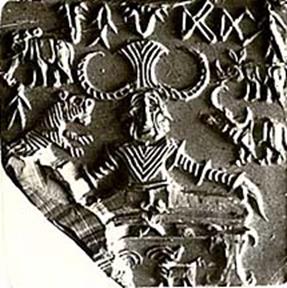
The symbolic sense of Vedic Ritual
The gods in the Rig Veda, which is the earliest Sanskrit text and said to be
the source of all the other texts, are Agni, Surya, Varuna, Mitra, the
Ashvin Twins, Sarasvati, Usha, Vayu, and Indra. While I do not agree with
Sri Aurobindo’s theories of evolution, I do find his analysis of the Rig
Veda compelling. He evaluates the Rig Veda from the inner esoteric
perspective.
Sri Aurobindo understands the term yajña to be symbolic: “We find in the
Gita the word yajña, sacrifice, used in a symbolic sense for all action,
whether internal or external, that is consecrated to the gods or to the
Supreme [the One]. …If these words could be interpreted symbolically, I [Sri
Aurobindo] found that the progression of thought became more perfect, more
luminous, more coherent…I felt therefore justified…in pursuing my
hypothesis…the symbolic sense of the Vedic ritual.”
Aurobindo says that the gods in the external sense are the “universal powers
of physical Nature personified; in any inner sense they must be universal
powers of Nature in her subjective activities, Will, Mind, etc.” By the
inner sacrifice to the gods, man can reach immortality. Agni for example
represents the fire of the divine Will and Wisdom. Surya is not only the Sun
as centre of our solar system, but [Surya] symbolizes “the superconscient
Truth.” Usha is not merely a physical dawn, she is “of a luminous movement,
vast with the Truth, supreme in (or in possession of) the Truth, bringing
with her Svar [heaven].” RV.V.801. “The Dawn is the inner dawn which brings
to man all the varied fullness of his widest being, force, consciousness,
joy…” Aurobindo concludes that, “The sacrifice is the giving by man of what
he possesses in his being to the higher or divine nature…the outer sacrifice
itself can be nothing but the symbol of an inner giving.”
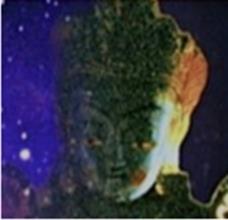
"...for he has Become their Self."
In my life of almost 70 years, I have seen over 30 UFOs and experienced six
months of visions showing me the colonization of this planet Earth by an
advanced civilization of extraterrestrials. While I can accept the idea that
other civilizations have come to Earth, perhaps experimented with our DNA
for their own purposes, and then even abandoned us to our own struggles, I
can find no reason whatsoever to bow down and worship these beings. Neither
can I accept the idea of bowing down and worshipping any being, even those
temporal beings in the Myriad Realms — except the ubiquitous One that dwells
within me and All.
This is my understanding from the verse in the Brihadaranyaka Upanishad
I.iv.10: "And to this day,
those who know the Self as I am Brahman [the One], become all this universe.
Even the gods [any other dimensional beings] cannot prevent his becoming
this, for he has Become their Self. If a man worships another deity
thinking: He is one and I am another, he does not know."
It is my view that the priestcraft variety of sacrificial ritual, animal and
human, was designed to take advantage of the desperate, confused and the
gullible. In the west we have had similar ruses in the guise of indulgences;
basically you pay the priest to nullify your sins, no matter how heinous and
get you into heaven.
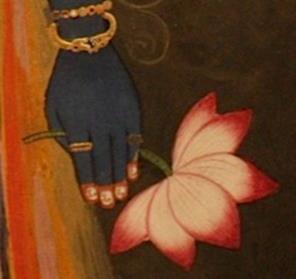
We are all portions of the One. The Oneness, Brahman, Parabhairava, the
Presence, or whatever name pleases you — That One dwells within the Heart of
us all. Who should demand that we bow down and worship them? No one but
wicked arrogant tyrants would ever conceive of needing to be worshipped, and
enjoying it.
If the youth in India are disenchanted and abandoning their sacred
traditions it is because of the abuses in both this ritual priestcraft and
the cruel unjust caste system that indeed justifies their disgust. This is
exactly what the Buddha railed against around 500 BC — and Krishna himself
in the Bhagavad Gita XVI.17, derides the hypocrisy of the wealthy
self-conceited, selfish, proud and arrogant, who sacrifice with no
understanding from sheer vanity.
As Swami Muni Narayana Prasad says, “…if you think those of demonic nature
will not be interested in religion and spiritual matters, you are wrong.
…often spending much money…desire for fame, for making themselves known as
religious [and charitable] people.” And Swami Lakshmanjoo says that these
hypocrites are rigid in their pride because they have so much money and
“they know no boundaries with [their] money. Money is just rolling before
those people. …O Arjuna, they actually, those people actually hate Me [the
Truth of the One], and they hate those who are residing in My meditation.”
"Dead ritual became the end in itself.”
It is entirely possible that when the technologically advanced civilizations
abandoned this planet, that those who remained began to mimic whatever
highly practical ‘rituals’ their mentors tried to teach them – which were
not rituals at all, but simply practical survival techniques. Doris Lessing
suggests this in her Canopus in Argos series. Malati J. Shenge has also
postulated a similar idea when she talks about the
mythopoeisation
of ancient Vedic history. I quote Malati J. Shendge’s insightful definition
of how history is turned into myth and ritual is born:
“When the events became symbolic and were ascribed magical powers to attain
certain aims, the process of mythopoeisation was complete. History was
forgotten and dead ritual became the end in itself.”
Truth got very lost.

I hope I have shed some light on these ideas regarding the meaning of yajña
sacrifice. In closing, I offer you one of my favourite gems of wisdom from
the Bhagavad Gita II.46 — Krishna says that the Vedas are of no more use to
the enlightened than a well, when the entire land is flooded on every side!
We are the One. We don't need tyrants and priestcraft. Truth is within us
all, waiting patiently, eternally. Tat Tvam Asi. Thou art That.
We Meet in the Heart,
V. Susan Ferguson

Lights on the Upanishads, with Sri Aurobindo Darshana, by T.V. Kapali
Sastry; Sri Aurobindo Kapali Sastry Institute of Vedic Culture, Bangalore,
1947, 2004.
The Woven Universe, Selected Writings of Rev. Maori Marsden; Published by
the Estate of Rev. Maori Marsden, 2003.
Secret of the Veda, Sri Aurobindo, 1914-17; Lotus Press, Twin Lakes, WI,
1995.
Bhagavad Gita, In the Light of Kashmir Shaivism, with original video,
Revealed by Swami Lakshmanjoo, Edited by John Hughes, Co-editors Viresh
Hughes and Denise Hughes; Universal Shaiva Fellowship, 2013.
The Gita for Modern Man, by Krishna Chaitanya; Clarion Books, Associated
with Hind Pocket Books, New Delhi, 1986, 1992.
KRISHNA CHAITANYA, A Profile and Selected Papers; Edited by Suguna
Ramachandra; Konark Publishers Pvt. Ltd., Delhi, 1991.
The Betrayal of Krishna, Vicissitudes of a Great Myth, Krishna Chaitanya;
Clarion Books, New Delhi, 1991.
Life’s Pilgrimage Through The Gita, by Swami Muni Narayana Prasad; D.K.
Printworld, New Delhi, 2005, 2008.
The Bhagavad Gita in the Mahabharata, A Bilingual Edition, translated by
J.A.B. van Buitenen; The University of Chicago Press, 1981.
The Bhagavad Gita, translated by Winthrop Sargeant; State University of New
York Press, 1994.
Abhinavagupta’s Commentary on the Bhagavad Gita, Gitartha Samgraha,
translated by Boris Marjanovic.
Srimad Bhagavadgita-Rahasya, or Karma-Yoga-Shastra, by Bal Gangadhar Tilak;
Eleventh Edition, Kesari Press, Pune, India, 1926, 2004.
'Canopus in Argos' by Doris Lessing; Alfred A. Knopf; more recent paperbacks
published by Flamingo, Harper Collins Publishers, London: Shikasta (1979);
The Marriages Between Zones Three, Four and Five (1980); The Sirian
Experiments (1980); The Making of Representative for Planet 8 (1982); The
Sentimental Agents of the Volyen Empire (1983).
The Civilized Demons: The Harappans in Rig Veda, Malati J. Shendge; Abhinav
Publications, New Delhi, 1977.
|
Questions
or comments about articles on this site: |
Copyright© V. Susan Ferguson |
Technical questions or
comments about the site: |
|
|